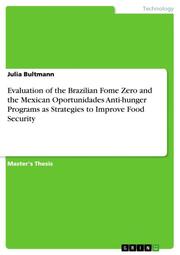Detailansicht
Evaluation of the Brazilian Fome Zero and the Mexican Oportunidades Anti-hunger Programs as Strategies to Improve Food Security
ISBN/EAN: 9783656940760
Umbreit-Nr.: 8070486
Sprache:
Englisch
Umfang: 148 S., 5 farbige Illustr.
Format in cm: 1.1 x 21 x 14.8
Einband:
kartoniertes Buch
Erschienen am 16.04.2015
Auflage: 1/2015
- Zusatztext
- Master's Thesis from the year 2013 in the subject Environmental Sciences, grade: 1,3, Cologne University of Applied Sciences (The present paper evaluates the two approaches Fome Zero and Oportunidades of Brazil and Mexico as strategies to improve food security. The analysis shows that various significant differences but also similarities exist in the structures of both countries), language: English, abstract: The present paper evaluates the two approaches Fome Zero and Oportunidades of Brazil and Mexico as strategies to improve food security. The analysis shows that various significant differences but also similarities exist in the structures of both countries. The Brazilian strategy, which was established in 2003, achieved exemplary good results in the fight against hunger and poverty because the food security strategy combines structural with emergency policies and includes various approaches in order to strengthen rural development. The extensive inclusion of family farmers for the supply of the national food demand keeps Brazil relatively independent from food imports and prevents the direct transmission of extreme international price fluctuations of essential food items to low-income households. The good result in poverty alleviation in Brazil caused a significant strengthening of the peoples purchasing power and thus provoked an economic growth in recent years which exceeds the capacities of the prevailing infrastructure and leads to a high demand of natural resources. This current situation provokes an unsustainable development. Mexicos joining of the North American Free Trade Agreement (NAFTA) in 1994 confronted millions of farmers with cheap, subsidized corn which is imported from the United States. This situation weakened the agricultural food production in Mexico and caused a dependency on international food products. Extreme price shocks provoked a considerable increase in national poverty rates in recent years, especially among rural farmers. The governments efforts in poverty alleviation by the establishment of the Targeted and Conditional Cash Transfer Program (TCCTP) Oportunidades in 1997 are insufficient, because this strategy principally suppresses the consequences of poverty but does not counteract its most important reasons. Additionally, in Mexico, overweight is not recognized in a sufficient manner as part of food insecurity. Furthermore, the country shows fundamental deficiencies in rural development and in the provision of adequate infrastructure. Finally, the country lacks of exit strategies and thus prevents low-income families from getting out of poverty. In the end, within this paper a framework of eight essential steps of a food security strategy was elaborated, which is considered not to be country-specific and therefore be useful on an international level.
